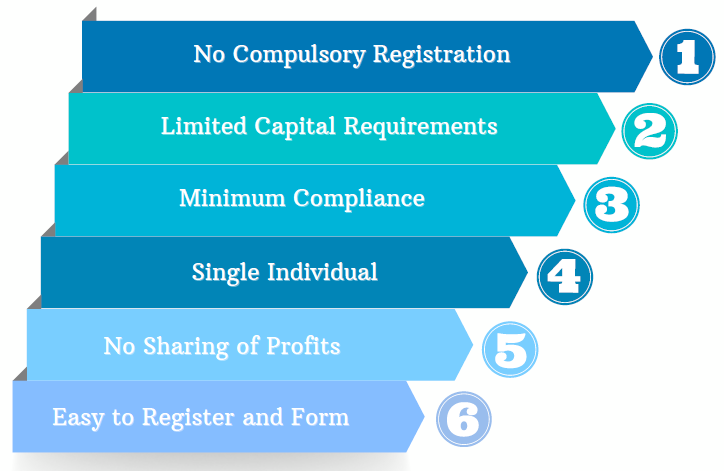Overview of Sole Proprietorship Registration
In India, the primary business structure followed by individuals is the sole proprietor model. A sole proprietor is also understood as a sole trader. A single individual primarily manages the business. Hence the term sole proprietorship is used for classifying this form of business.
A significant portion of the Indian subcontinent comprises of rural areas. In these areas, many individuals run business and small scale industries. Hence, the government came out with the sole proprietorship model for running a business. There are limited compliances which have to be filed by the sole proprietor.
This would provide ease of conducting business and flexibility for business operations. Usually, in India, when an individual commences a business as a sole trader, then registering is not mandatory. Some of the advantages of this form of business structure make it one of the best structures to be considered for a business entity.
Common sole traders would include barbershops, sweet shops, snack shops and individuals planning to start MSME.
Statutory Meaning for Sole Proprietorship Registration
There is no concise definition for the meaning of a sole proprietorship. However, in layman terms, the business of a sole trader is defined as a one-man business or where an individual undertakes to manage the activities of the business solely.
Sole Proprietorship registration is not defined under any law. Nor there is any form of regulation governing the registration of a sole proprietorship business.
The principle of separate legal entity would not be applicable for a sole proprietorship firm, and hence such business cannot be transferred. To become a sole proprietor, it is mandatory to be a resident Indian.
What is the meaning of a sole trader?
The very essence of sole proprietorship provides a comprehensive meaning towards a sole trader. A sole trader or sole proprietor is an individual carrying out the activities of the business. Hence managing the activities of the business would be carried out by a sole trader.
As only one individual is running the business, there is more responsibility. However, there is no form of profit-sharing ratio. Due to this the sole trader gets to keep all the profits. Any loss which is incurred by the sole trader would make the liable.
Sole Proprietorship Firm Advantages
There are many advantages of sole proprietorship registration. It is important to consider the advantages and then incorporate a sole proprietorship firm. The following are the advantages of a sole proprietorship firm:

No Compulsory Registration
There is no compulsory registration required for the sole trader business. However, if the business is carrying out activities that require registration as per the MSME Act 2006 then such registration is mandatory. However, there are few registrations which are mandatory to be carried out by the business of a sole proprietor:
- Shops and Establishments Act
Every state in India has respective registration requirements with the authority for carrying out any business. Hence the applicant needs to register compulsory with the shops and establishments act of the local authority.
Under the MSMED (Micro, Small and Medium Industries Development) Act, it is crucial to carry out the process of registration.
- Goods and Services Act, 2017
Under the GST Act, it is important to carry out the registration process. This would only be applicable if the turnover of the business exceeds Rs 40 lakhs in the case of a supplier business and 20 lakhs in case of a service-oriented business.
Limited Capital Requirements
There is minimum or limited capital requirements for sole proprietorship registration. For example, the capitalization requirements for other forms of business entities would depend on the capital subscribed by the promoter. Depending on the owner of the business, the capital will be contributed.
Minimum Compliance
There is limited compliance for a sole proprietorship registration when compared to other forms of business entities. For example, under the Companies Act, 2013 both private limited companies and public limited companies are regulated. However, there are different forms of compliances which have to be filed under this act. Such a requirement is not needed for sole proprietorship registration.
Single Individual
One of the main advantages of a sole proprietorship business is the requirement for the business to be run and managed by a single individual. This would negate the requirement for having more than one individual. Minimum numbers of individuals are not required for a sole trader.
No Sharing of Profits
Another advantage of this form of business is no sharing of profits. The individual is an entrepreneur and enjoy all the profits of the business entity. Like other forms of business entities such as partnerships, profits have to be shared equally between the partners. There is no such requirement for a sole proprietorship registration.
Easy to Register and Form
As mentioned earlier, there is minimum compliance when it comes to registering a sole proprietor business. Even after the process of registration is complete, there is minimum ongoing compliance required for this form of business.
Owing to the above benefits, it would be suitable for an individual to go for the above business structure.
Is it beneficial to opt for Sole Proprietorship Registration?
Taking all the above advantages it would be surely beneficial to opt for the above business structure. The following reasons make it clear as to why a sole proprietor business is beneficial:

The power to make a decision is reserved with the owner of the sole proprietorship business. No consent is required from other partners or shareholders. If one chooses another form of business structure then the requirement of consent is considered before taking or making any decisions.
There is no other authority over the sole proprietor. Hence taking decisions for the welfare of the business entity becomes straightforward. This would not be the case in a private limited company or a public limited company, where the directors of the company consider decision making. This decision has to be ratified by the shareholders in a general meeting of the company.
-
Profit Making Power on Sole Owner
Any profits earned after sole proprietorship registration would go towards the owner of the sole proprietorship concern. There is no requirement of any profit sharing between any individual. All authority to utilize profits is present with the owner of the sole proprietorship firm.
The above reasons make it beneficial for an individual to consider going for proprietorship firm registration.
Sole Proprietorship Registration Procedure
.png)
-
Choose the name of the Sole Proprietorship
The first step in the sole proprietorship registration is choosing a unique name for the sole proprietorship. The name of the sole proprietorship must not go against any intellectual property laws in India. As per such the name of the sole trade, organization must not be offensive.
-
Select the Location for Carrying out Business Activities
In the next step, the sole trader requires to select the place of establishment of the business. This requirement is crucial as the sole proprietor would have to register with the relevant authority. Such authority will include the Shops and Establishments Act and Relevant Government Authorities.
As per the MSMED Act, 2006 a sole trader or sole proprietor is required to register under the MSMED to carry out activities. The MSME (Micro, Small and Medium Enterprises) Registration or such Udyog Aadhaar registration can be secured in the name of the sole trader. This would be required to be compliant with the laws of MSMED Act.
The Tax Deduction Account number should be immediately obtained from the requisite Income Tax Authority or department. This would only be necessary, if the sole proprietor is making some form of salary payments under the TDS system (Tax Deducted At Source). Hence under sole proprietorship registration, the above would only be required in case of salary payments.
Under the Goods and Services Tax Act, 2017 traders are required to obtain registration if the turnover of the business exceeds a specific amount. Turnover would relate to the annual turnover of the business. For a service entity, if the annual turnover exceeds more than Rs. 20 Lakh then GST registration is required. For a trading business, if annual turnover exceeds more than Rs. 40 lakhs then GST registration is required.
-
IEC Registration (Import- Export Code Registration)
In case the sole trader is carrying out export of goods outside India, then IEC registration has to be made by the business. This registration has to be made to the Director General of Foreign Trade (DGFT). This license would not be required in case; the sole trader is not conducting any business related to import and export of products.
FSSAI registration would only be mandatory where the business is carrying out activities related to making or packaging foods products. This license would also be required if the sole trader is handling food-related products. If required the proprietor must apply for the license from the respective authority i.e. the FSSAI (Food Safety and Standard Authority of India).
When the procedure related to sole proprietorship registration is complete, the business of trading can commence.
Post Compliance requirements for Sole Trader
The following post compliance requirements have to be considered by a Sole Trader:
-
GST Registration- If required-
20 Lakhs in the case for services
40 Lakhs in case of trading activities.
GST returns have to be made quarterly
-
Intellectual Property Registration- if required-
Trademarks
Copyrights
Designs
-
Income Tax Filings
-
Income Tax Returns Filings
-
Tax auditing requirements and compliance
-
Documentation of invoices for filing GST tax
-
Financial Statements
Documents Required for Sole Proprietorship Registration
- Respective documents for registering with the municipal authorities
- GST Registration Certificate
- IEC Certificate
- Licenses granted by medical authorities, pharmaceutical and other authorities to carry out the business.
- FSSAI Registration and License Certificate
- Utility Bills- Such as electricity and water
- Rental Documents- in case the place is leased out, then NOC (no objection certificate) is required.
- PAN- Permanent Account Number
- Address Proof
- Bank Account information
- Aadhaar Card
TAP GLOBAL Advantage- Sole proprietorship registration
- TAP GLOBAL main aims are to add value to your business.
- Our team of professionals comprising of Chartered Accountants, Company Secretaries, Lawyers, and Financial Executives.
- We have experience in registering different forms of entities.
- Constant monitoring and 24*7 customer service.
How to reach TAP GLOBAL for Sole Proprietorship Registration?

Fill The Form

Get a Callback

Submit Document

Track Progress

Get Deliverables